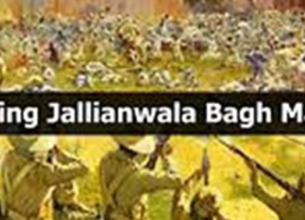INDIA’S INTERIM GOVERNMENT, 1946
03, Sep 2019

Prelims level : History of Modern India
Mains level : GS-I- Modern Indian History from about the middle of the Eighteenth Century until the Present - Significant Events, Personalities, Issues
Why in News?
- On September 2, 1946, the interim government of India led by Jawaharlal Nehru was formed. It was the only such cabinet in India’s history in which arch-rivals Congress and the Muslim League shared power at the Centre. The interim government functioned with a great degree of autonomy, and remained in power until the end of British rule, after which it was succeeded by the Dominions of India and Pakistan.
Events That Led to The Formation of Interim Government:
- Starting with the Cripps mission in 1942, a number of attempts were made by colonial authorities to form an interim government in India.
- In 1946, elections to the Constituent Assembly were held following the proposals of the British Cabinet Mission dispatched by the British Prime Minister Clement Attlee.
- In this election, the Congress obtained a majority in the Assembly, and the Muslim League consolidated its support among the Muslim electorate.
- Viceroy Wavell subsequently called upon Indian representatives to join the interim government.
- A federal scheme had been visualised under the Government of India Act of 1935, but this component was never implemented due to the opposition from India’s princely states.
- As a result, the interim government functioned according to the older Government of India Act of 1919.
The Interim Cabinet:
- On September 2, 1946, the Congress party formed the government. On September 23, the All-India Congress Committee (AICC) ratified the Congress Working Committee’s decision.
- The Muslim League initially decided to sit out of the government, and three of the five ministries reserved for Muslims were occupied by Asaf Ali, Sir Shafaat Ahmad Khan, and Syed Ali Zaheer, all non-League Muslim representatives. Two posts remained vacant.
- However, after Lord Wavell agreed to allot all five reserved portfolios to the Muslim League if it agreed to cooperate, the latter finally joined.
- In October, the cabinet was reshuffled to accommodate the new Muslim League members, and Sarat Chandra Bose, Sir Shafaat Ahmad Khan and Syed Ali Zaheer from the earlier team were dropped. Baldev Singh, C.H. Bhabha, and John Matthai continued to represent minority communities.
The cabinet after October 1946 was as follows:
| MEMBERS | PORTFOLIOS HELD |
|---|---|
| Jawaharlal Nehru | External Affairs & Commonwealth Relations |
| Sardar Vallabhai Patel | Home, Information & Broadcasting |
| Dr. Rajendra Prasad | Food & Agriculture |
| Dr. John Mathai | Industries & Supplies |
| Jagjivan Ram | Labour |
| Sardar Baldev Singh | Defence |
| C.H. Bhabha | Works, Mines & Power |
| Liaquat Ali Khan | Finance |
| Abdur Rab Nishtar | Posts & Air |
| Asaf Ali | Railways & Transport |
| C. Rajagopalachari | Education & Arts |
| I.I. Chundrigar | Commerce |
| Ghaznafar Ali Khan | Health |
| Joginder Nath Mandal | Law |
Significant Decisions by Interim Cabinet:
- On September 26, 1946, Nehru declared the government’s plan to engage in direct diplomatic relations with all countries and goodwill missions. He also expressed support for the independence of colonised nations.
- In November 1946, India ratified the Convention on International Civil Aviation. In the same month, a committee was appointed to advise the government on nationalising the armed forces.
- In December, Maulana Abul Kalam Azad was inducted into the cabinet.
- The year 1947 saw the opening of diplomatic channels between India and many countries. In April 1947, the US announced the appointment of Dr. Henry F. Grady as its ambassador to India. Embassy level diplomatic relations with the USSR and the Netherlands also started in April. In May, the first Chinese ambassador Dr. Lo Chia Luen arrived, and the Belgian Consul-General in Kolkata was appointed Belgium’s ambassador to India.
- On June 1, the Indian Commonwealth Relations Department and the External Affairs Department were merged to form the single Department of External Affairs and Commonwealth Relations.
- After Partition was announced on June 3, a dedicated cabinet sub-committee was formed to deal with the situation on June 5, and consisted of Jawaharlal Nehru, Sardar Vallabhai Patel, Liaquat Ali Khan, Abdur Rab Nishtar and Baldev Singh.







